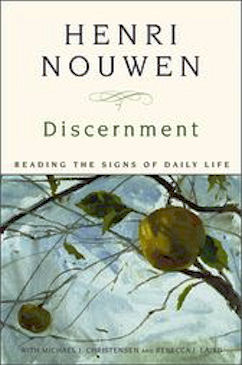
|
Posted August 8, 2013
Book: Reading the Signs of Daily Life: Discernment Author: Henri Nouwen with Michael J. Christensen and Rebecca J. Laird Harper One. New York. 2013. Pp. 223 An Excerpt from the Preface:
The premise of this book is that God is always speaking to us --- individually and as the people of God --- at different times and in many ways: through dreams and visions, prophets and messengers, scripture and tradition, experience and reason, nature and events. And that discernment is the spiritual practice that accesses and seeks to understand what God is trying to say. When we are rooted in prayer and solitude and form part of a community of faith, certain signs are given to us in daily life as we struggle for answers to spiritual questions. The books we read, the nature we enjoy, the people we meet, and the events we experience contain within themselves signs of God's presence and guidance day by day. When certain poems or scripture verses speak to us in a special way, when nature sings and creation reveals its glory, when particular people seem to be placed in our path, when a critical or current event seems full of meaning, it's time to pay attention to the divine purposes to which they point. Discernment is a way to read the signs and recognize divine messages. Henri Nouwen is a trustworthy guide in this ancient spiritual practice. An Excerpt from the Book: Remember Who You Are When the truth of our identity begins to descend from our minds into our hearts, we may not feel peace and joy! How easy it is to reject part of you as not really yourself and claim only your ideal self as your real self. Can you and I remember that we are the beloved of god when we fail? When we hurt someone else? Even then, we are God's beloved called to remember that beneath our woundedness or frailty is the deeper call to live out of the inexhaustible riches of God's love. Often, as the desert father and mothers and the contemplatives from the Christian tradition affirm, in solitude and meditation the dark and wounded side of us that is still in need of healing often asks for attention and has to be acknowledged as just as much a part of us as our idealized selves. We all have the deceptive tendency to live selectively, choosing to see only those experiences we can identify with as our real experiences and pushing the rest aside. By bringing the whole self to our attention, we not only claim our dark side but also change our ego ideal, the persona or idealzed self that is only part of who we are. In a way, in the stillness we cultivate, we become free to stand as we are before God and transcend our limited view of ourselves. The ego ideal is often made up of self-created expectations and aspirations regarding intelligence, career, physical beauty, moral stature, and so on. The mystery of life, however, is not only that we have a dark side which we want to deny but also that we are better than our own ego ideal! Our true identity is found in God, who created us in the divine image. We are bearers of God's image and spirit. That is the revelation of God within our innermost self. Often in quiet meditation and reflection we discover that we are our than our individual selves and come to realize who we really are. We slowly learn to see, within our very own hearts, the reflection of the one who breathed life into us. There we come to the remembrance of God, who loved us before we were born and before we could love ourselves or try to prove ourselves worthy of love. The truth about ourselves is that we are more than ourselves, more than what we think or express, more than our physical presence, more than our personality and character. The problem with the excessive reliance on psychology today (and I am a psychologist) is that we tend to give it the last word. But the beauty of psychological awareness is that it can point beyond the character qualities it describes to the person it reveals. Beneath any diagnosis or mental health problem, there is a person who carries God inside. Psychology can give us helpful language for the varied parts of who we are, but we need theology to remind us that we can never be defined by personality or any disorder. We are defined by something deeper and wider than those aspects. This is what is meant when we speak about the soul --- that identity where we are most personal and most Godlike. Table of Contents: Part One: What is Discernment? 1. Embracing the practice of solitude and community 2. Distinguishing spirits of truth and falsehood Part Two: Discerning Guidance in Books, Nature, People, and Events 3. Read the way forward 4. Read the book of nature 5. Pay attention to people in your path 6. Discern the signs of the times Part Three: Discerning Vocation, Presence, Identity and Time 7. Test the call : discerning vocation 8. Open your heart: discern the divine presence 9. Remember who you are: discerning identity 10. Know the time: when to act, when to wait, when to be led Appendix A: We drink for our own wells: discernment and liberation by Henri Nouwen Appendix B: Henri Nouwen on hearing a deeper beat by Michael J. Christensen Appendix C: Spiritual friendship and mutual discernment by Robert A Jonas |
|
